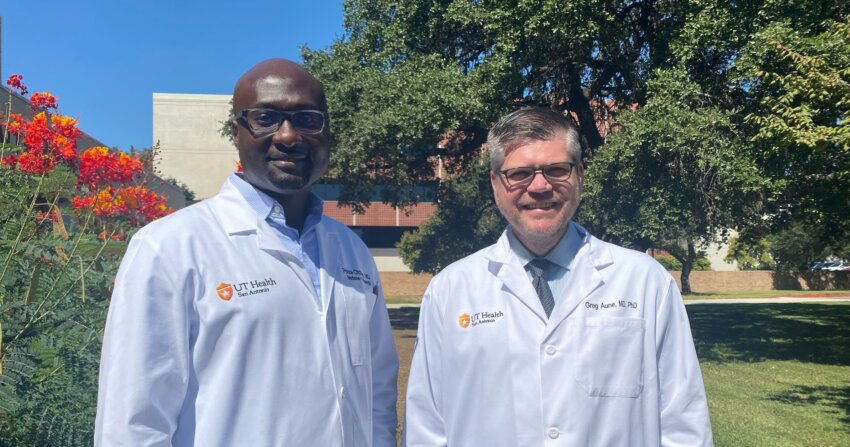The cardio-oncology program at The University of Texas Health Science Center at San Antonio has been recognized by the International Cardio-Oncology Society as a Center of Excellence, reflecting its exceptionally high level of expertise in cardiovascular care of cancer patients and survivors.
Cardio-oncology is a quickly developing field focusing on safe treatment of cancer patients who also have cardiovascular conditions. Radiation, chemotherapy and associated treatments can damage the heart and vascular system, with dysfunction occurring during or shortly after treatment, or years later.
“This important recognition milestone represents the rapid coalescence of our diverse but aligned faculty in cardiology, and adult and pediatric oncology,” said Allen Anderson, MD, chief of the cardiology division at the health science center, also known as UT Health San Antonio. “Our evolving collaboration with the Mays Cancer Center, home to UT Health San Antonio MD Anderson Cancer Center, will ensure these unique patients receive world-class care here.”
“A Center of Excellence designation is reserved for those institutions that truly excel at delivering care in a comprehensive, interdisciplinary fashion to afford the best patient outcomes possible,” said Ruben A. Mesa, MD, FACP, executive director of Mays Cancer Center. “For us, it aligns with our mission to do everything it takes.”
Fewer than 20 institutions worldwide hold an IC-OS Center of Excellence designation. The honor distinguishes institutions as “citadels of expertise for the care and treatment of patients within the cardio-oncology sphere,” according to the IC-OS.
High-energy leadership
The program here is led by Prince Otchere, MD, director of cardio-oncology at the Mays Cancer Center, and an assistant professor of cardiology at UT Health San Antonio; and Gregory Aune, MD, PhD, a pediatric oncologist and researcher with the Greehey Children’s Cancer Research Institute at UT Health San Antonio, and an associate professor at its Long School of Medicine.
Dr. Otchere was recruited to build the cardio-oncology program at UT Health San Antonio, and has brought “welcomed high energy and focus” to the position, Dr. Anderson said. He is one of two board-certified cardio-oncologists with the program, along with Anatole Trakhtenbroit, MD, a UT Health San Antonio cardiologist who founded the first cardio-oncology clinic in San Antonio.
Dr. Otchere originally studied molecular genetic technology at MD Anderson Cancer Center in Houston, before going on to earn his medical degree. He served his residency and cardiology fellowship at Kettering Medical Center in Ohio, sub-specializing in cardio-oncology.
He is a contributing author of the first examination review book for the cardio-oncology field. And he is working on creating cardiac-risk prediction tools to help oncologists anticipate patients who are most at risk in developing heart or vascular issues, as an enrollee of the epidemiology program of the Harvard University School of Public Health.
“This honor is an important designation for our program as it recognizes our effort in providing high-quality patient education and clinical care to patients,” Dr. Otchere said. “It also gives us a way to measure our standard to other institutions nationally and internationally, to make sure we are always striving for excellence.”
A personal stake
Dr. Aune’s personal battles with both cancer and heart disease would guide his academic path toward cardio-oncology. He was successfully cured of Hodgkin lymphoma at age 16, undergoing a year of chemotherapy and radiation treatments that 18 years later would result in open-heart surgery to replace his aortic valve and bypass three coronary blocked arteries.
“With the population of cancer survivors continuing to grow year over year, it is essential that we develop the clinical infrastructure to lessen the cardiovascular burden of successful cancer therapy,” Dr. Aune said. “The IC-OS certification of our program is an honor that validates our commitment to improving cardiovascular health in South Texas cancer survivors and to develop cutting-edge research programs focused on lessening treatment-induced health morbidity.”
Go here to read a profile of Dr. Otchere posted last fall on Newsroom.


